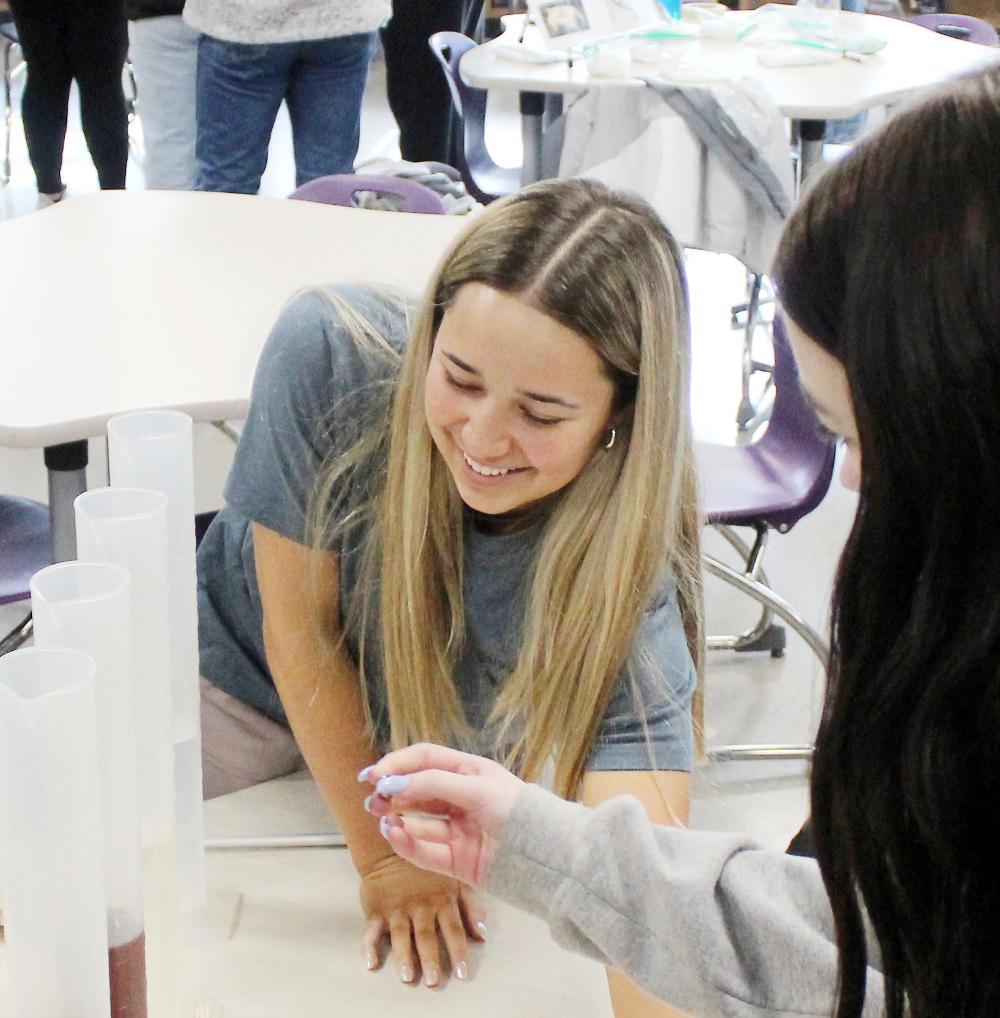Northeast students strengthen STEM knowledge during visit from Huskers
December 12, 2023
Lincoln Northeast students kept their academic gears spinning Dec. 1 by discovering engineering principles ranging from viscosity to elasticity.
Dozens of high school and college students filled Northeast’s library with a buzz of educational activity. University of Nebraska-Lincoln sophomores in the College of Agricultural Sciences and Natural Resources (CASNR) led many Rockets enrolled in the Early College and Career STEM (Science, Technology, Engineering, Math) Program at Northeast.
Luci and Rai were engaged as they moved through different engineering stations. The Northeast ninth graders are both in Wendy Martin’s fifth-period differentiated geoscience class. They were happy to take part in the inaugural interactive event with the Huskers.
“I really liked the station about viscosity, and I also liked when we got to make slime,” Rai said. “I’m usually not a fan of getting dirty, but this was fun.”
“I liked learning about what college is like from everyone here,” Luci said. “It was good to hear from them and see what they get to do.”
Bailey Feit coordinates the STEM-based program at Northeast. She beamed as she watched CASNR students begin to set up their activities for the afternoon. She said it was a good opportunity for high schoolers to learn how integral engineering is to their everyday lives.
“Engineering is a common career, but a lot of our students don’t know yet how it connects with agriculture and natural resources,” Feit said. “I think that’s why this is so beneficial. They’re getting a chance to understand that engineering isn’t just about big buildings. You use engineering when you’re talking about all sorts of things like water and cars and farming.”
LPS added the Early College and Career STEM Program in collaboration with UNL to its lineup of focus programs in 2021. Its goal is to provide students with a firm foundation in science and agricultural topics. A large portion of the curriculum revolves around the themes of food, energy, water and societal systems (FEWSS).
All of the UNL students who visited Northeast are sophomores who are enrolled in a course called “Engineering Properties of Biological Materials.” The future agricultural and natural resources engineers are learning about physical properties important to the design of harvesting, storage and processing systems for agricultural crops. They are also examining how to measure properties such as frictional effects, moisture content, thermal conductivity and modulus of elasticity.
UNL students Morgan Heckman and Avery Florea were members of four-person teams that guided Northeast students from the geoscience, physical science and engineering design classes.
“I was really excited when I heard that we were going to get to do this,” said Florea, who was an honor roll student and All-State singer at Lincoln Southwest. “It’s totally different from sitting in a class. This is a lot more fun, because we’re getting to help students learn.”
“It’s been a lot of fun getting to prepare for this,” said Heckman, who went to high school in Savannah, Mo. “I think everyone in our group has enjoyed it.”
Heckman and her teammates led a station that focused on the impact of viscosity on engines. Viscosity is the measure of a fluid’s resistance to flow and describes the internal friction of a moving fluid. It affects how hard an engine works in vehicles such as cars, tractors and semis.
Northeast students dropped marbles in four plastic cylinders filled with honey, corn syrup, water and hydraulic fluid. They timed how long a marble took to reach the bottom of each cylinder, and they used that data to determine the viscosity of each substance.
The marble dropped to the bottom of the water-filled cylinder the quickest. Some students felt water would be the best substance to use in engines if viscosity was the only determining factor. Heckman explained water is not a good option because it easily freezes. Hydraulic fluid becomes thicker in colder temperatures, but it is easier on engines than a gooier substance like honey.
Florea and her teammates taught a lesson about non-Newtonian fluids, which see their viscosity transition to either more liquid or more solid depending on stress. For example, toothpaste changes properties depending if it is contained in a tube or brushed on teeth, and a bottle of ketchup becomes runnier when it is shaken.
All ninth grade and sophomore students at Northeast study FEWSS concepts in their math, science, social studies and world language classes, and upperclassmen can take college-credit courses through the STEM program. Feit said the program’s goal is to help students understand the many ways STEM and FEWSS topics impact Nebraska.
Heckman said she was impressed by the different types of learning opportunities LPS students have in their classes. She said she would have enjoyed being in their spots growing up.
“It would have been really cool to have had something like this in high school,” Heckman said. “It would have been a ton of fun to get to learn from college kids, so we’re wanting to make this as good of an experience for them as we can.”
Learn more about the Early College and Career STEM Program at Northeast by visiting the focus program’s website at https://eccsp.lps.org/.
Do you have a story idea? Share it with the LPS Communications Team by filling out this form!
Published: December 12, 2023, Updated: December 12, 2023

University of Nebraska-Lincoln student Morgan Heckman beams as she leads Lincoln Northeast students in an engineering activity Dec. 1. The Rockets learned about viscosity by dropping marbles in cylinders filled with different liquids. Students filled Lincoln Northeast's library for a wide range of educational lessons.
